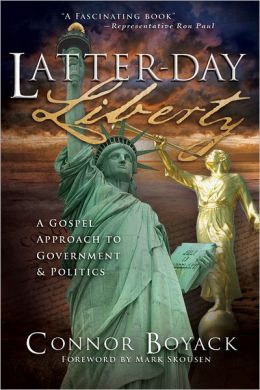 I bought a copy of Connor Boyack's Latter Day Liberty. As the title implies, the book talks about liberty in the language used by members of the LDS Church sprinkled with quotes from LDS leaders and a Libertarian interpretation of LDS Theology.
I bought a copy of Connor Boyack's Latter Day Liberty. As the title implies, the book talks about liberty in the language used by members of the LDS Church sprinkled with quotes from LDS leaders and a Libertarian interpretation of LDS Theology.I've read books by left leaning Mormons who interpret Mormon Theology with a social progressive spin. There is also a sizable library of people presenting Mormonism with a conservative spin. As a non-Mormon I have no ideas which of the spins is true. It seems to me that Mormonism, like most religions, is a collection of beliefs and historical trends that can be interpreted in any number of ways.
The book might have some value to a member of the LDS Church who are looking for ways to support Libertarian views in politics and free market positions in economics. As a non-Mormon, I simply felt that Mr. Boyack was cherry picking quotes to frame LDS Church thinkers as leaders in Libertarian thought. The convoluted thoughts are apparent in this quote about education on page 202:
"Fourteen years before he said it, the National Commission on Excellence in Education agreed with President's Hinckley's characterization of social mediocrity ..."
Yes, the author just stated that the National Commission on Excellence in Education was influenced by a statement made fourteen years after the commission's report.
In the linear thinking of the classical liberal tradition, causes usually come before effects, and the sentence does not come off well.
Mr. Boyack pulled many other tricks that I disliked. For example he summarily dismisses the United Order of Enoch which was clearly an attack on property rights. Boyack mentions numerous confrontations between Joseph Smith and mobs, but fails to acknowledge that, more often than not, the mobs were disgruntle followers.
The sequence of the Order of Enoch was as follows: Joseph Smith wrote tome called "The Book of Commandments." The "Book of Commandments" demands that the faithful surrender all of their property to the Church. The church would use the funds to build a new Zion and distribute as it saw fit.
Joseph Smith's followers rebelled and destroyed copies of the book.
Joseph Smith rewrote the "Book of Commandments" as "The Doctrine and Covenants." After facing the angry mob, Joseph Smith was slightly more supportive of property rights.
The sequence of events matter. Boyack's version of history attempts to frame Smith as a wizened leader who brought property rights to an ignorant following. In my opinion, the linear order of events provides a more pertinent version of history. In linear history, Joseph Smith was as an ambitious leader attempted to take the property rights from his followers. His followers protested and forced Smith to take a more liberal approach to property rights.
BTW, I know the real order of events because social progressive members of the LDS Church interpret the fall of the Order of Enoch as follows: They say that Joseph Smith was a great progressive leader who sought to bring forth a brave new socialist order. In their spin, a greedy right wing mob rebelled against social justice and forced the prophet to capitulate on property rights.
The fact that social progressive and libertarian forces in the LDS Church have diametrically opposed interpretations of the same series of events makes me dubious of the different claims related to the rise and fall of the Order of Enoch.
Oddly, while Mr. Boyack failed in providing an accurate view of different interpretations of LDS scripture and history, Latter Day Liberty includes some excellent insights into the ever changing nature of the left/right split as the parties routinely change position on key issues. In partisan history one finds that conservatives are routinely supporters of economic and political centralization and there have been rare moments in history when the left supported decentralization of power. Unfortunately, Boyack presents this quality research in a way to create the illusion LDS History has been steadfast and true when its positions have been almost as fluid as the world at large.
In conclusion, the work Latter Day Liberty should have some value to members of the LDS Church seeking to argue free market positions. The work does not provide much value to people who are not in this church.
No comments:
Post a Comment